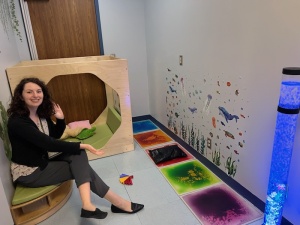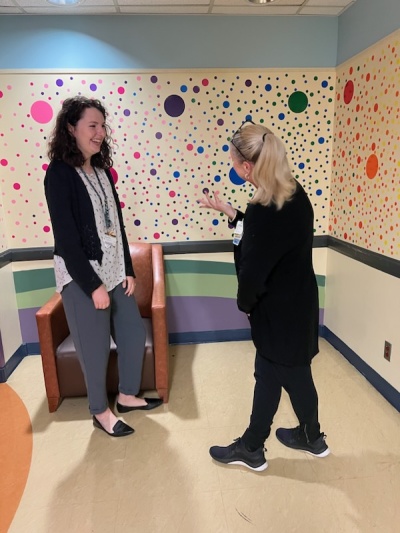 I am a Psychiatric Mental Health Nurse Practitioner (PMHNP) in Child and Adolescent Psychiatry Division. After spending my first year and a half in the department providing care in both inpatient and outpatient settings, I have recently transitioned to a fully inpatient role. At the Vanderbilt Psychiatric Hospital, I work on the child and adolescent units providing care to pediatric patients who are admitted for acute safety concerns. Children present with various conditions such as mood disorders, impulse control disorders, substance use disorders, psychotic disorders, and PTSD. I work as part of interdisciplinary team of nurses, social workers, behavioral health staff, and physicians to provided well rounded care to our patients. During my workday, I help kids unpack their emotions, teach them coping skills, call and meet with their families, and manage their medications.
I am a Psychiatric Mental Health Nurse Practitioner (PMHNP) in Child and Adolescent Psychiatry Division. After spending my first year and a half in the department providing care in both inpatient and outpatient settings, I have recently transitioned to a fully inpatient role. At the Vanderbilt Psychiatric Hospital, I work on the child and adolescent units providing care to pediatric patients who are admitted for acute safety concerns. Children present with various conditions such as mood disorders, impulse control disorders, substance use disorders, psychotic disorders, and PTSD. I work as part of interdisciplinary team of nurses, social workers, behavioral health staff, and physicians to provided well rounded care to our patients. During my workday, I help kids unpack their emotions, teach them coping skills, call and meet with their families, and manage their medications.
One of the biggest challenges I face in this role is the lack of placement availability for my patients who cannot return safely home after discharge. There is a general shortage of psychiatric residential treatment facility options across the country for kids who need longer term psychiatric care. To complicate matters further, a large number of the children I see are in state custody. Unfortunately, the reality is that there are not enough foster families who are able to take in children with complex mental health needs. Despite facing these barriers, I am blessed to be able to meet children and families where they are and offer my knowledge, care, and support when they are navigating perhaps one of the most difficult moments of their lives.
I have had the privilege of participating in the Medical Exploration of Neurodevelopmental Disorders (MEND) research clinic with Dr. Joshua Smith. We recently published a retrospective research study in the Frontiers of Child and Adolescent Psychiatry. In this study, we evaluated the safety and efficacy of alternative treatments other than lorazepam for patients with pediatric catatonia. The study showed that there was statistically significant improvement in symptoms and quality of life for alternative agents such as clonazepam. As most of the patients in this study also had a neurodevelopmental disorder such as autism, this finding may help clinicians better tailor treatment for this vulnerable population.
When I am not working, I can be found with my husband hiking, cooking together, or watching a comedy. I am also very close with my family and see them on the weekends as I am a local Tennessean.
